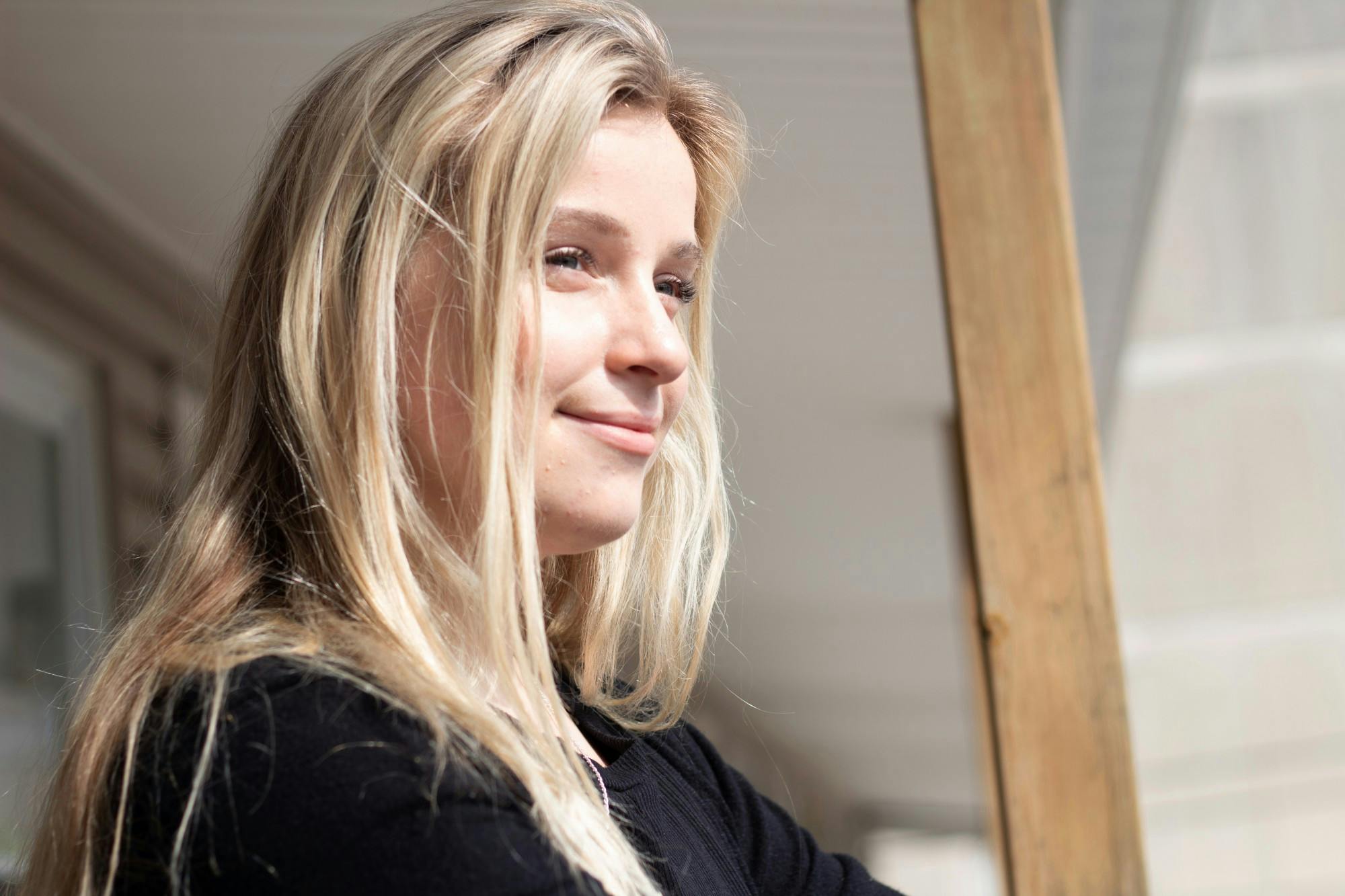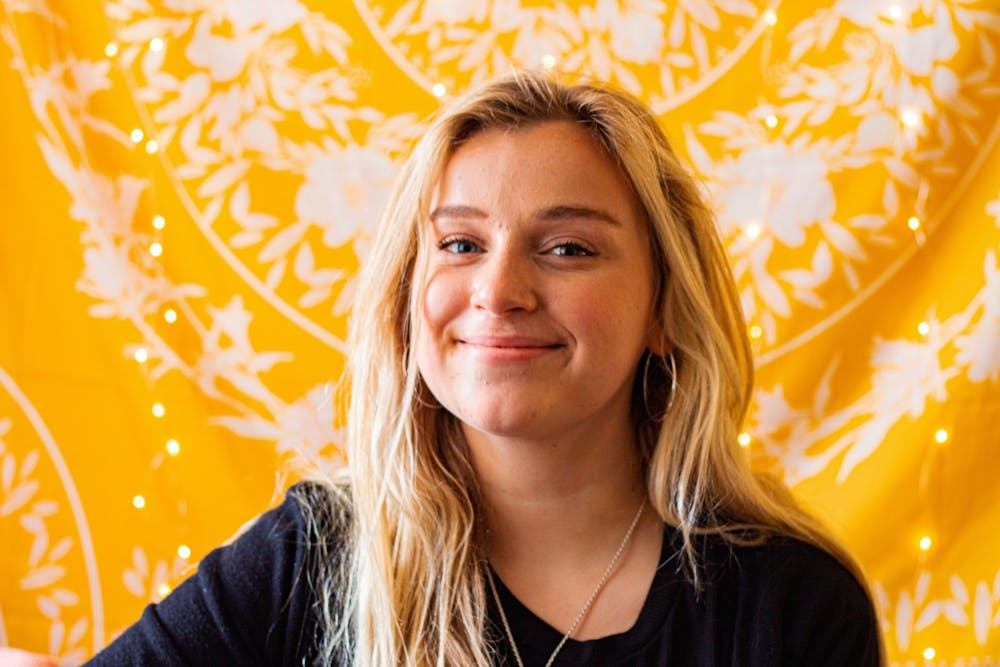The sound of ceramic coffee mugs rattling and an espresso machine whistling fills the air. The pour of liquid can be heard filling to-go cups, grabbed by patrons shuffling in and out as quickly as possible, based on the sounds of the door. Some people slurp their coffee, while others share laughs.
The sounds come from a small speaker inside of IU sophomore Lara Van Vuuren’s apartment, where she lives alone.
“It creates an atmosphere of conversation,” Van Vuuren said. “It almost filled the surroundings of people and conversation I was depleted of.”
At 11, Van Vuuren was diagnosed with Attention Deficit Hyperactivity Disorder and Attention Deficit Disorder. She said the ambient noise helps occupy her brain and makes her feel less isolated, a feeling she’s had to deal with living alone during the COVID-19 pandemic.
In March 2020, Van Vuuren, an international student studying vocal performance and minoring in psychology, had to withdraw from her classes due to intense anxiety as the pandemic began. She returned to her home in South Africa to spend two weeks in a psychiatric facility. She then moved back in with her family, where she lived for six months.
During her time living with her family in South Africa, she realized how much she wanted the independence she believed comes with living alone. She said she decided it would be best to get an apartment alone for the fall 2020 semester because mental health was her priority, and she hoped the freedom of her own space would help her heal.
“The first couple weeks were liberating,” Van Vuuren said. “I was getting groceries by myself, doing my own thing.”
After two weeks, Van Vuuren began to feel lonely. The pandemic was at its peak on IU’s campus during the week of Aug. 31, 2020 with the positivity rate reaching 7.26%, and Van Vuuren didn’t feel safe leaving the house. All of her classes were online except for her vocal lessons, and she felt alone.
Van Vuuren said she spent a couple of hours on FaceTime every day, but it didn’t help. Sometimes, she wants to call up a friend to hang out in person but doesn’t want to feel like a burden. She said most of her friends have roommates and don’t have to reach out for social interaction as much as she does.
“There’s something about FaceTime that doesn’t stimulate,” Van Vuuren said. “Proximity to another person syncs the conversation.”
Van Vuuren said she considers herself an extrovert. The COVID-19 pandemic makes it harder for her to socialize with others, something she said she now considers a luxury rather than a right.
“We tend to be more extroverted because we can’t create enough stimulation for ourselves,” Van Vuuren said of people with ADD and ADHD.
A 2017 study found adults with ADHD are at an increased risk of feeling lonely compared to adults who do not have ADHD. An estimated 2.5% of adults have ADHD, according to the American Psychiatric Association. Anxiety disorders affect 18.1% of the population every year, according to the Anxiety and Depression Association of America.
People between the ages of 18-44 who live alone reported higher rates of anxiety and depression compared to those living with others, according to the Household Pulse Survey conducted by the United States Census Bureau in the fall. The survey provides insight into mental health of those living alone during the pandemic.
Social isolation can lead to poorer mental health in children and adults and can be particularly detrimental to those with ADHD because it often occurs alongside anxiety or depression, according to the Centers for Disease Control and Prevention.
Chris Meno, associate director for Counseling and Psychological Services at IU, said the pandemic has caused or exacerbated certain mental health issues for many students.
“Living alone and limiting social interactions is hard for most of us,” Meno said. “That’s not how humans are supposed to work.”
Meno said the number of students who use CAPS services has increased during the pandemic. The number of students in group counseling services has expanded due to the need for connection with others, she said.
Van Vuuren, who was diagnosed with anxiety during her freshman year, had regular sessions at CAPS throughout her freshman year before moving to a therapist in private practice in July, 2020. She said living alone with ADD, ADHD and anxiety has presented a challenge to create structure and activity for herself.
Van Vuuren said her ADHD causes her to lose focus and fidget, desiring movement she can’t always get in her one bedroom apartment. When she feels anxious, the apartment starts to feel even smaller.
Van Vuuren said she balances her need to socialize with staying safe by leaving her house twice a day. Even if it is just to get coffee or groceries, it attempts to fill a need for social interaction and mental stimulation.
“Living alone is nice because I always have an escape,” Van Vuuren said. “But it gets extremely lonely sometimes.”

At first, Van Vuuren couldn’t wait to live alone.
“I was extremely excited,” Van Vuuren said. “Last year I had lived in a dorm, and I was coming back from living with my family for six months.”
Van Vuuren said her dorm experience contributed to her desire to live alone. She lived in a quad with three roommates during the first semester of her freshman year. At the beginning of the year, the three women asked her if she would be willing to find other living arrangements, so a friend of theirs could move in with them. She was willing to move but was not granted approval by Residential Program Services to move dorms.
She pushed RPS to let her move to a different dorm, but she said they wouldn’t allow her to move. Tensions heightened between her and her roommates, and Van Vuuren said she was desperate to find different living arrangements.
“I’d leave a coffee out on the table, and they’d whisper about it behind my back,” Van Vuuren said. “I realized I wasn’t feeling safe in that space.”
Although the pandemic can be taxing on her mental health, she said she does appreciate having the safety net that is her apartment after lacking a space where she felt safe for so long.
“I feel like I’ve reasserted dominance living alone,” Van Vuuren said.
Van Vuuren starts her day around 7 a.m. She walks to her closet and grabs a pair of high waisted jeans. The tight pants cling to her torso and legs. She wants the outfit to be uncomfortable because it wakes her body up and forces her to focus on something other than the physical discomfort she feels.
“I can’t wear sweatpants and a hoodie, or else I’ll feel unproductive,” Van Vuuren said.
Most days, she cycles through her collection of colorful sweaters. She even puts on her shoes because it makes her feel like she is out of her house and inside a classroom instead of feeling trapped alone in her apartment. It gives her consistency, something she feels she desperately needs.
She logs onto Zoom for her music theory class every morning. After music theory comes aural skills class where musicians learn to identify pitches and intervals, then German, followed by a piano class.
She’ll walk to campus later in the afternoon to use a music practice room in the Music Annex building or Merrill Hall to practice for her weekly voice lesson, perhaps stopping for a coffee at Soma on the way. Her last class is choir, where she sings in the Soprano I section, the highest voice part in her choir.
When she leaves the house, she wears two masks and sometimes gloves to keep herself safe. She said she was more fearful of getting COVID-19 during the fall compared to now but is still cautious. She has a small circle of friends she sees regularly, she said.
September and October 2020 were her lowest points, she said. She said the lowest of lows still happen, probably once a month. She describes her lows as a physical experience as much as emotional.
Her heart starts beating quickly and she feels physically ill. Last semester, she took a trip to the emergency room because she couldn’t stop vomiting during a panic attack. If she had to verbalize how the anxiety feels?
“Pure fear,” Van Vuuren said.
“When you’re alone, having these anxiety attacks, it feels like the world is ending,” Van Vuuren said. “In that moment, loneliness kicks in.”
She said the pandemic has made her anxiety attacks more challenging because she has to deal with them in her apartment, by herself. To calm herself down, she said she has to distract herself with an activity because her ADHD requires stimulation, even during an anxiety attack, she said.
She relies on exercise or playing music. She said she enjoys lifting weights in her living room and playing piano or guitar.
Mayi Reyes, an IU sophomore, met Van Vuuren on their first day of music theory class their freshman year. She said she thinks living alone during the pandemic exacerbated some of Van Vuuren’s anxieties.
“She’s an anxious person,” Reyes said. “I think living alone has almost amplified some of those anxieties because she doesn’t have roommates close by she can consistently talk to about stuff.”
However, Reyes said she’s noticed that Van Vuuren has gotten better at putting her mental health first and thinks it comes from the time she spent alone in her apartment this year.
“She’s gotten good at checking in with herself and managing what she needs,” Reyes said. “She’s even been able to help me with that when I feel like I can’t do it for myself.”
Reyes said she is grateful Van Vuuren was able to find healthy, consistent patterns for herself because it’s helped her grow, something she said the people around Van Vuuren have definitely noticed.
“I admire how she prioritizes her mental health,” Reyes said. “I’m just really happy she was able to come back to school in the U.S.”
In January, IU announced it would require students to be tested for COVID-19 weekly, a move Van Vuuren said makes her feel more comfortable to be around others. In addition to being tested weekly, she received her first dose of the COVID-19 vaccine on April 6. She said she even recently tried a cycle class at the gym, something she hadn’t been comfortable doing before, but feels more comfortable doing because vaccinations are widely available in Indiana.
Positive cases on IU’s campus have decreased this semester, compared to the fall. Monroe County is under yellow advisory on Indiana’s color-coded COVID-19 dashboard, meaning there is a lower risk of the coronavirus spreading.
Van Vuuren said the best way to manage her mental health while living alone during the pandemic is by sticking to a routine.
“You’re not thinking, you’re just doing,” Van Vuuren said. “My brain just needs to find patterns and structures.”
In the fall she’ll be moving into a house with two other women, something she said she’s excited about.
“I know living with people also presents its challenges, like conflicts and fights,” Van Vuuren said. “Sometimes, I wish I had that, just to have more stimulation.”
Van Vuuren said while living alone has presented challenges, it has helped her be OK with spending time alone and allowed opportunity for growth.
“Sometimes I feel like I don’t know who I am without people appreciating me,” Van Vuuren said. “But living alone has made me appreciate myself more.”




